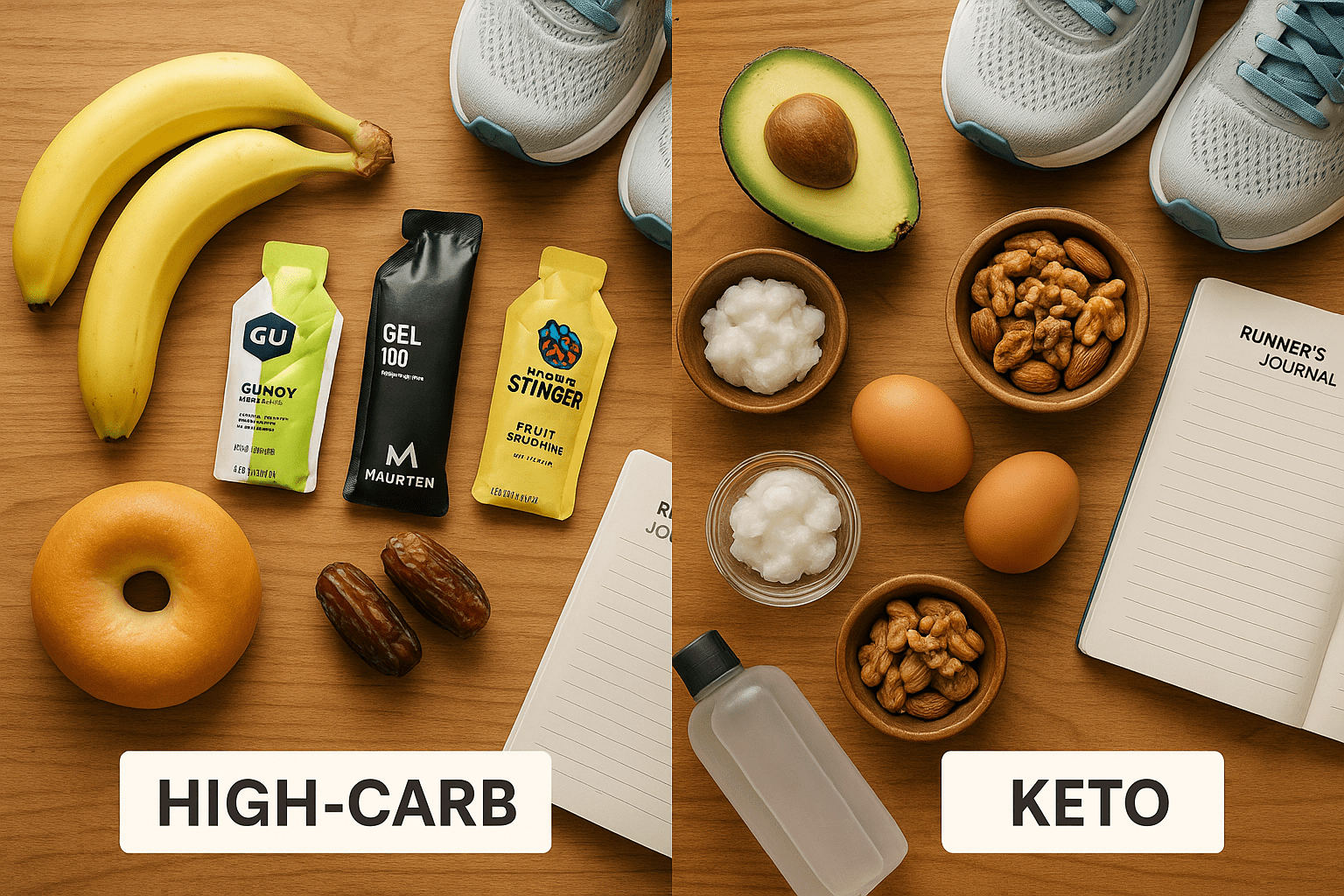Introduction: The Great Keto Debate for Runners
You’ve done the speed work. You’ve logged the miles. But when your energy crashes mid-run or your stomach rebels on race day, you start to wonder: is there a better way to fuel?
Enter the keto diet.
Some runners swear it changed their lives—more energy, no crashes, leaner bodies. Others warn it destroyed their performance. So, what’s the truth?
If you’re running long, chasing PRs, or just trying to feel better out there, this guide will unpack the science and real-world experiences around keto and running performance.
What Is the Keto Diet, Really?
At its core, the ketogenic diet is high in fats (typically 70-75% of daily calories), moderate in protein, and very low in carbs (usually under 50 grams a day).
This extreme carb restriction forces your body into ketosis — a metabolic state where fat is broken down into ketones and used for energy instead of glucose.
But let’s be clear: keto isn’t just low-carb. It’s very low-carb, and that distinction matters when it comes to running.
The Science Behind Keto and Endurance
How Keto Affects Metabolism During Exercise
When you run, your body usually relies on a mix of carbs and fat for fuel. The harder you go, the more your body demands carbs. But once you’re keto-adapted (which can take 3-6 weeks), your body gets more efficient at burning fat for fuel.
This is known as fat adaptation. For low-to-moderate intensity efforts, it can be a game changer. Your body taps into virtually unlimited fat stores instead of relying on limited glycogen.
What Research Says About Keto and Running
Studies show mixed results:
- Positive for ultra-endurance athletes doing long, steady efforts
- Negative for high-intensity or speed-based training
One notable study (Faster Study, 2015) showed keto athletes could burn fat at over twice the rate of high-carb athletes. But they didn’t perform better on sprint efforts or high-output segments.
So if you’re racing ultras at a steady pace, keto may help. If you’re training for a 5K or doing interval work? You may struggle.
Benefits of Keto for Certain Types of Runners
Fat Adaptation in Ultra Events
Ultra runners and thru-hikers sometimes use keto to avoid “bonking” or hitting the wall, especially in races with limited fueling opportunities. The steady fat burn can mean fewer fuel stops and a more even energy output.
Appetite Control and Weight Management
Keto is naturally appetite-suppressing for many people. This can make calorie management easier, especially during base training.
Reduced GI Distress
If you’ve ever had to dive into the porta-potty mid-race, you know how important gut comfort is. Keto diets often eliminate processed sugars and gluten, reducing gastrointestinal issues for some.
Drawbacks and Risks of Keto for Runners
Slower Top-End Speed
Glycogen is king for explosive speed. Without it, your top-end power may take a hit. This is why many keto-adapted runners still use targeted carbs around workouts.
Initial Fatigue and Keto Flu
The adaptation period is tough. You may feel sluggish, moody, or dehydrated. This “keto flu” usually lasts 1-2 weeks.
Electrolyte Imbalance and GI Issues
Low carb intake affects insulin and sodium retention. If you don’t increase electrolytes, you may suffer cramps, dizziness, or nausea.
Real Runners, Real Results
Some ultra-marathoners report feeling more clear-headed and steady after keto adaptation. Others hit a plateau in performance or found it too hard to sustain.
Take Sarah, a 50K runner who used keto to train for her first ultra: “I had zero crashes during the race, but I missed carbs during tempo workouts. Now I do low-carb on easy days, and fuel harder workouts with fruit or rice.”
Balance is key.
Should You Try Keto as a Runner?
Keto isn’t for everyone.
It might work for you if:
- You run long and slow
- You struggle with GI distress
- You’re focused on fat loss or metabolic health
But reconsider if:
- You train at high intensities
- You need carbs to stay motivated
- You enjoy a balanced, varied diet
There are hybrid options too:
- Targeted keto: small carb intake around workouts
- Cyclical keto: carb up on certain days
How to Experiment Safely
If you’re curious, take a structured approach:
- Start with education: Understand keto macros and what ketosis feels like.
- Ease in: Cut carbs gradually instead of going cold turkey.
- Track progress: Energy, pace, recovery, mood.
- Prioritize electrolytes: Salt, potassium, magnesium matter more on keto.
- Fuel long runs: Try nut butters, coconut oil, or keto gels like Muir Energy.
And always listen to your body. If performance tanks or motivation dips, don’t force it.
Conclusion: Fuel What Fits You
There is no one-size-fits-all answer when it comes to diet and running.
Keto can be a useful tool for some runners, especially those who thrive on fat adaptation and slower-paced endurance. But for others, the carb cut may come at the cost of power, speed, and joy.
The truth? You are your own best experiment. Your best performance will come not from following the latest trend, but from tuning into your unique needs.
So whether you’re a carb lover or keto curious, remember: fuel is personal. And when you get it right, your runs become something more than workouts. They become freedom.
You deserve that.





